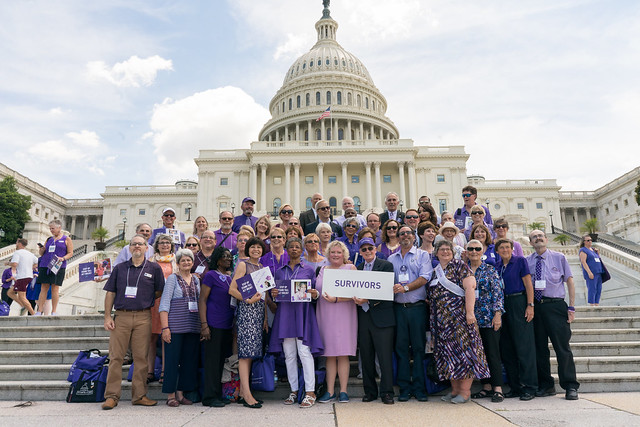The Experience
"As survivors, we seem to get more attention, make greater impact. Perhaps the legislator/staff member has never previously met a pancreatic cancer survivor. The best way to understand that impact and how best to use it is to physically attend Advocacy Day. Participating in action alerts and National Call-In are important, but the "in person" experience in DC is the best teacher."
— Diane B., survivor
"My experience at Advocacy Day was very positive, and I was so proud of the survivors for telling their stories and the family members for explaining what they've lost. You can feel in the room the positive warmth and energy for anyone talking and it really is a cohesive group. It was such a big group that for both senate meetings we had to meet in the hall because there was no room big enough to hold us all. While some might say that's a bit impersonal, I say that it is a show of force that is very powerful. When you have 65 people that travel from your state and meet with staffers, that sends a very powerful message."
— Amy O.
"Meeting members of Congress is an uplifting and empowering example of how one individual can make a difference. To be able to tell your story and have a Senator, Congressperson, or one of their legislative assistants paying attention to every word you say is incredible. My wife has attended twice, one of my daughters 5 times and the other daughter also twice. It is just as important for survivors to have their caregiver and family attend to be able to tell their story as well."
— Michael W., survivor
"It's very empowering to meet with members of Congress/staff to share our personal stories, show them photos and to see that you've actually touched them in some way. I come to Advocacy Day each year because it's important to keep telling my story, as well as to support the others who have similar stories as well. Participating at Advocacy Day was life changing. It puts a whole new perspective to the importance of speaking for those not able."
— Roberta L., survivor
"I want the Congress men and women to know about my grandfather. I bring a photo of him with me and show it to them. I know it is not the same as him being here so I try to tell them stories about who he was and what he loved to do. I like being with the survivors because several of them remind me of my Denny so it's like he's with me when they give me a hug or talk with me. I go to advocacy day to remember my grandfather, but I also go because I want this disease cured so that no other kid has to feel this pain.
— Jackson C.
"We brought our grandchildren to Advocacy Day and we all had a very positive experience. The one thing that stood out was how receptive all of the legislative aides were to cancer funding. All stated the importance of all of the cancer initiatives needing to be funded and understood how deadly pancreatic cancer is."
— Steve L.
"If anyone reading this is thinking about going but hasn't yet stepped up, I say, 'Do it! Honor that person you love who's been affected by pancreatic cancer, and change the course of this disease.' We all know cancer is bad, and we want a cure, or at least an early diagnostic tool, but Advocacy Day educated me about the funding that's needed to get there. I feel much more informed."
— Karen T.
"I have met some of the greatest people in the world attending Advocacy Day. I have a network of friends, including survivors, volunteers and staff which is second to none. It is a way to turn dealing with such a horrible disease into something extremely positive."
— Michael W., survivor
Previous
Next
Turn Capitol Hill Purple
Advocacy Day is an incredible bonding experience for those who choose to attend either by themselves or with their families, friends or colleagues. The more voices we can bring to the Capitol to deliver our message to Congress, the farther we can go.
Why Advocacy Day Matters
The federal government is the largest source of research funding for pancreatic cancer research, accounting for approximately 80 percent of all research funding. To double pancreatic cancer survival by 2020 – and far surpass this milestone – we need more research in the field.
Each year, your members of Congress determine how much is allocated to cancer research. Meeting your elected officials and their staff in-person is the most impactful way to ensure Congress prioritizes funding lifesaving cancer research for a disease with no early detection strategy and no treatment options that offer a cure.
Advocacy Day is an opportunity for you to bring your story to Washington, D.C. to raise awareness about pancreatic cancer, to speak on behalf of those who could not, and provide hope for the future.
Special Thanks To







